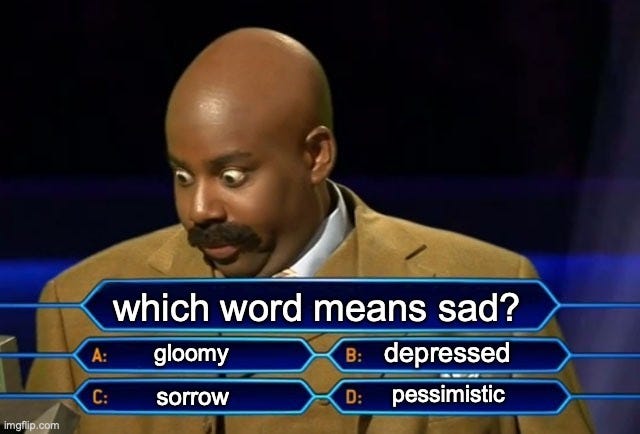You can do better
Growing your target language by nurturing your native language
Welcome, aspiring polyglot! Something many people fail to recognize until several months or even years into their second language acquisition is that their success is tied to their proficiency in their native language. At one point or another the realization is made, but if you approach your language acquisition intentionally from the jump you will save yourself quite a bit of time.
The benefits of having a large vocabulary and an intimate understanding of your native language grammar structures cannot be overstated. Grammar is vital for successful language acquisition, that is certain. For this post, however, we are going to focus on my favorite part, the vocabulary.
Benefits of having a large vocabulary
While there are countless benefits to expanding your competencies in your native language, the one most people will feel most of the time is the benefit of having a bigger base to pull from when trying to speak. When you are trapped with only one or two ways to say something it can be difficult to craft your sentences in a way that allows you to express yourself adequately. Developing the ability to find ways to say things is crucial and having a large vocabulary will facilitate this process.
Not only that, but one of the greatest feelings is finally being able to express oneself in a precise, accurate, and eloquent way. In order for that to happen you have the requisite vocabulary base. After all, how can you learn a word in your target language if you don’t know that word, or at least a similar word, exists in your native language? This is certainly true for people learning languages within the same language family, but it also works with other languages.
Here is an example of what that might look like in Spanish:
The word, “masticar” means “to chew” in Spanish, but in English we have the word “masticate” which also means to chew, but is only used in a scientific setting. If you know that, though, you can figure out what the word “masticar” is without ever having seen it. English is unique in that many of the words we use are pulled from multiple languages. That means you can use this trick to learn several new languages, not just one within the same language family.
Looking at the etymological roots of different words can also make this entire process easier. If you are learning a romance language, learning the English words that come from a Latin base will likely offer you a leg up in your language studies. Fortunately, that means you can set this exercise up in a targeted way by focusing mostly on words that share a common base with the language you are learning. Germanic, Latin, Greek, Slavic, learn the etymological roots and watch how many words you are able to add to your repertoire.
Reasons a small vocabulary is holding you back
It is already difficult enough to learn hundreds even thousands of new words in your target language. The last thing you need to be doing is trying to learn the definition of a new word in both of the languages you speak. That is the primary reason I recommend reverso.com as a translation app, it will provide additional context and possible synonyms for you to see and use as well. If the exact word you are looking for doesn’t seem to make sense, maybe one of the available synonyms will.
There are many ways to say the same thing and if you only ever take time to learn one you may struggle when you cannot remember that one way. Most of the time people will learn variations of “hello” and “how are you” if only to avoid saying the same thing all the time. Alternatively, it may come to pass that when you are put on the spot and have to speak you cannot remember the “easiest” way or the “shortest” way. Since you took the time to learn three ways to say something you now have three options to pull from. If you can’t remember one, maybe you’ll remember another.
Nothing is quite as frustrating as always being forced to use the same set of preprogrammed responses. This is the primary issue with trying to memorize singular words rather than learning to use them in context. The problem is exacerbated when your vocabulary in your native language is limited as it will be clear in your target language. Taking time to build your vocabulary in both your native language and target language will enhance and accelerate your language acquisition.
Ways to build your vocabulary
The absolute best way to build your vocabulary, especially as a solo learner, is by reading. Authors tend to do their best to say things as eloquently as possible and this often means using a vocabulary that the general populous simply does not have. Even better is reading books that would be and are considered “classics” whether they are originally in your target language or translated. These books will offer a unique challenge and force you to develop your language skills quickly.
Depending on your level, you can read anywhere from 1 to 20 pages and you will almost certainly be faced with new vocabulary words you have not seen. Try at first to figure out what they mean by using context clues, but if you cannot figure it out then look it up on reverso.com to see if you know any of the synonyms. You will be shocked how many words you have to look up, even if you have been studying a language for years. That is a good thing, though, and offers you quite the opportunity.
In an ideal world, all of this reading will inspire you to start writing. Even if it is only a few sentences every day, writing will help you train yourself to think in your target language. You need to be creating and writing is one of the simplest ways to start. As you are doing this, breaking out a thesaurus can make a huge difference. When you are struggling to say something precisely the way you want to, a thesaurus is the perfect tool.
Fortunately, there are people out there who act as walking thesauri and making friends with these people can help you hone your skills. They are often willing to help and simply being around them will force you to learn more. One of the reasons I speak French so well is because the person who spent the most time speaking with me has a larger vocabulary than 99% of the French speaking population. I know it will work for you because it worked for me, so give it a try.
Conclusion
After much deliberation, I maintain firmly that a large vocabulary is paramount to successful language acquisition. Even if you end up demolishing the grammar, it will only be for a short time and people will still understand what you are talking about and, over time, you will find grammar falls into place. There are things you can start doing today to build your vocabulary base and take that one step closer to speaking your target language.
Growing your vocabulary in your native language may feel like a waste of time at first, but if you are actively learning a new language you will see it begin to pay off quickly. The more points of reference you have to pull from the better and establishing them within your native language is advantageous simply because it is the language you know the best, for now. It will be a slower process than learning new words in your target language, but it will be worth the effort.
Second language acquisition is no easy feat, it will be difficult irrespective of how you approach it. Using the strategies listed here can and will enhance and accelerate your language learning experience, it will not be easy. But you can do difficult things and be great, so continue to do difficult things and be great. I will be here by your side endeavoring to do the same.
Eager for more Second Language Strategies?
For more content find me on Twitter or Instagram. If you are struggling to get speaking in your target language, get up to 55% off a Babbel subscription using this link. I look forward to seeing everyone’s progress in the months and years to come. Be sure to check out the YouTube channel as well!
Learning Spanish? We have begun aggregating resources in you Spanish Resource Newsletter!
Don't forget to pick up your very own French Language Logbook or Spanish Language Logbook!








Synonym rolls lol...